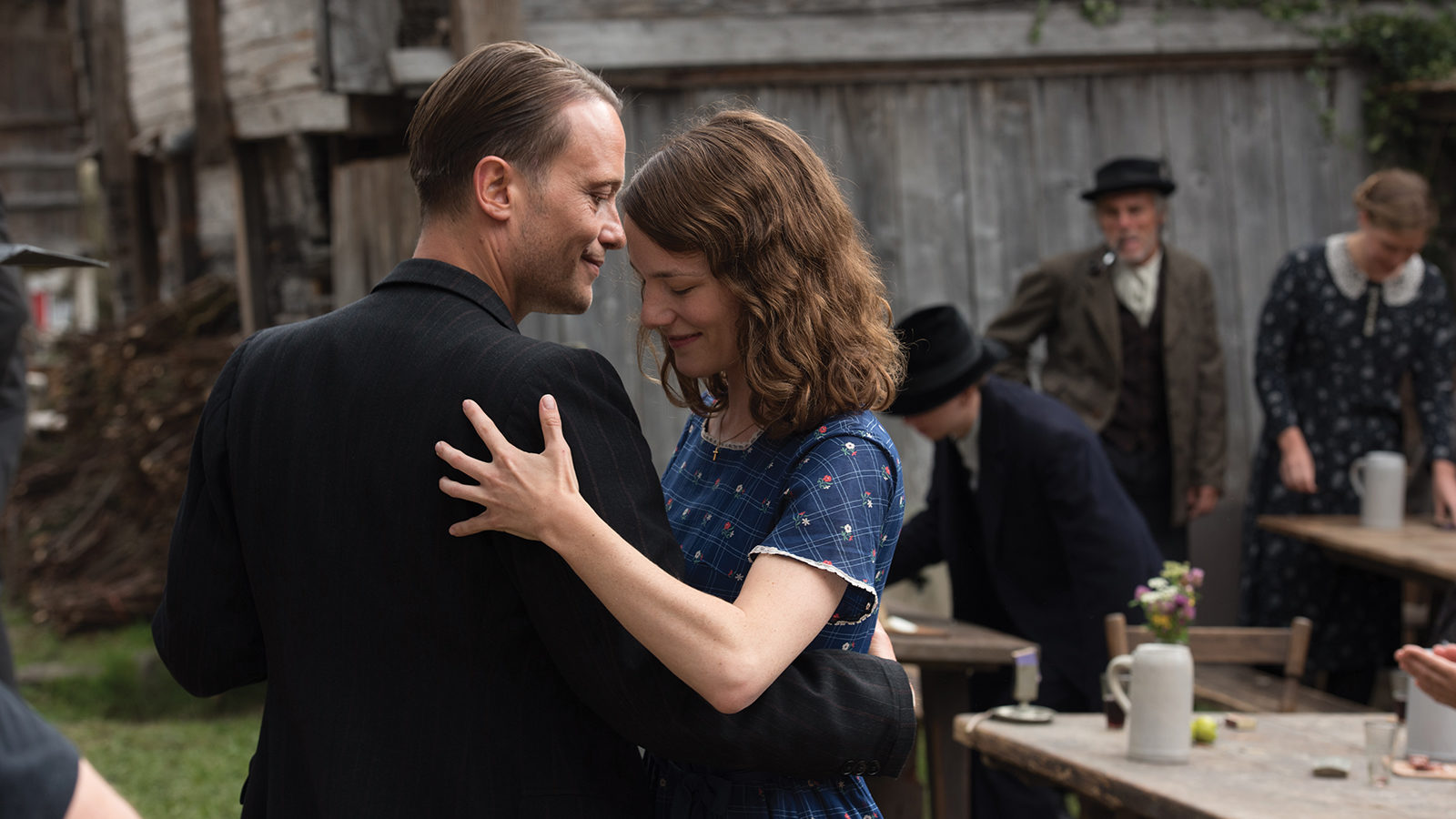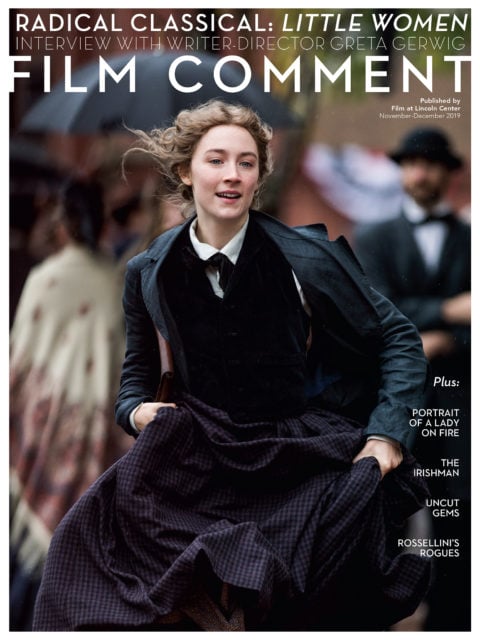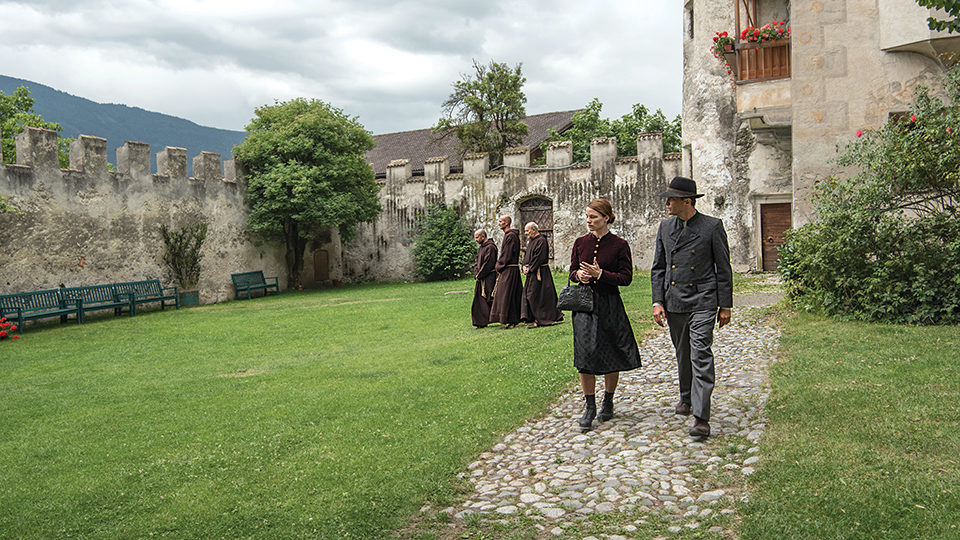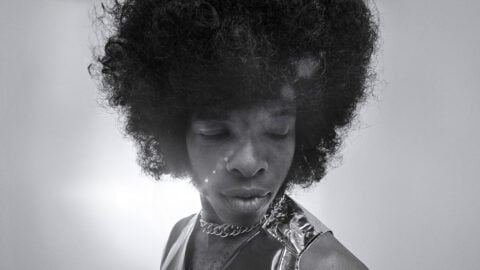
The Big Screen: A Hidden Life
Is this the end of the world? The death of the light?”—Franz Jägerstätter

Terrence Malick’s latest is about Franz Jägerstätter, an Austrian conscientious objector who refused to sign a loyalty oath to Hitler and was imprisoned and then beheaded on August 9, 1943. In practical terms, his refusal “meant nothing.” The war did not stop. Millions were killed. But what would have happened if a whole nation had followed his example? In 2009, Jägerstätter’s letters from prison were published (Malick includes much of this material in the film). Two years earlier, the Catholic Church beatified Jägerstätter in Linz, Austria. A man of deep faith, he has always been an important figure in Catholic circles, and A Hidden Life brings him to a wider audience. The film is a meditation on the nature of faith, of belief in God even (or especially) in a lunatic world.
Franz (August Diehl) and his wife, Franziska (Valerie Pachner), work their farm in a small village perched on a hill-side in the Alps. They have three small children. The work is difficult, but they are a happy family. In 1939, Franz is called up for basic training, and he goes, reluctantly. He is disturbed by the war frenzy. When he returns home, he finds his village in full-on Nazi mode. Not only is Franz shocked by the transformation of his neighbors, he is also disheartened by the church’s unwillingness to take a stand. (The infamous 1933 concordat between Germany and the Vatican—whereby Hitler promised not to destroy the churches if the priests agreed not to “get political” in their sermons—is not name-checked in A Hidden Life, but it is everywhere present.) When Franz is conscripted, he refuses to sign the loyalty oath. Imprisonment follows, along with tribunals, interrogations, and torture. The village—and its church—shuns his family back home.
Over and over again, Franz is told his disobedience will not make a difference. Why not just sign the oath, even if he doesn’t mean it? In one scene, Franz is called before the Reich’s military tribunal, where a Nazi judge (the late Bruno Ganz) asks Franz, almost gently, “Will what you’re doing change the world or the war?” To Franz, the question is irrelevant. Everyone hopes they will behave like Franz, will see the forces of evil rising around them and resist. The question is trickier when a guillotine awaits you at the end of a dark hall. (The execution scene is one of the most harrowing sequences Malick has ever filmed.)
The scenery in Franz’s village is ravishing, all vistas and cloud banks and nearly vertical slopes. (The cinematographer was Jörg Widmer, who has worked as a camera operator on many of Malick’s films.) Many people get annoyed with Malick’s obsession with nature, but it is so much a part of who he is as a filmmaker that it’s impossible to imagine him without it. I’ve had my internal arguments with Malick over the years. I’m slightly tired of women twirling through fields. I’m not sure I believe in “innocence” the way he does, and my idea of nature is more of the “red in tooth and claw” variety.

Valerie Pachner and August Diehl A Hidden Life (Terence Malick, 2019). Photo by Reiner Bajo. © 2019 Twentieth Century Fox Film Corporation
But Malick’s is a questioning sensibility, his camera always searching, looking for the light, peering through windows and skylights, moving up stairways, through treetops. In a footnote in his college thesis on Martin Heidegger, Malick observes: “Heidegger has developed a whole mythology on the model of light . . . We see what we see by virtue of the light of the sun. We do not attend to the light, but through it, to the things of the earth . . . Since we take the light for granted, we become aware of its (former) presence only once it is absent.” Malick’s entire career can be seen as a quest to not “take the light for granted.” It is a quest with no destination.
The question “how can god allow bad things to happen to good people?” is crucial in all of his films, particularly in The Thin Red Line and The Tree of Life, which opens with Mrs. O’Brien’s wail of grief at the news of her son’s death—and to Malick it may be the only question that matters. Franz and Franziska battle this in their own way in A Hidden Life: they have lived good lives, faithful lives, so shouldn’t they be rewarded? This brings us to the real issue with the film, which is Malick’s point of view.
Focusing on the single journey of a man living in an isolated, homogenous village in Austria means that the Holocaust is not foregrounded; in fact, it’s barely present. This choice, controversial for good reason, limits the film’s scope and power. Jägerstätter’s protest was ethical and spiritual in nature: he did not believe in bowing down before a single man. Bowing should be reserved for God. The brainwashing of the other people in his village is presented as nationalistic rather than racist or anti-Semitic. There are no Jewish characters in the film.
The opening montage, taken from Leni Riefenstahl’s Triumph of the Will, is a nod in the direction of the larger context, but ignoring it is a serious flaw. Malick has not shied away from politics in the past. The young soldiers in The Thin Red Line are served up as cannon fodder in order to take a solitary hill, and The New World has explosive politics embedded within its romantic “take” on first contact. A Hidden Life is his most political film, taking place during one of the defining cataclysms of human history, and yet one man’s battle to stay true to his faith pales in comparison to the millions killed because of their faith.
However, Malick’s poetic and passionate exploration of Franz’s resistance provides insights into our ethical and moral obligations as citizens. In one scene, Franz visits an ornate church where a humble artist paints brightly colored murals on the pure white walls. The artist says, “A darker time is coming. I paint their comfortable Christ, with a halo on his head. Someday I’ll paint the true Christ.” Radical words. Jesus did many things, but among them was peaceful disobedience to an unjust civil authority. On social media, people share a picture of a lone man in a crowd refusing to do the Nazi salute, complete with text: “Be this guy.” We should all be that guy. A darker time is coming. A darker time is now.
Sheila O’Malley is a regular film critic for Rogerebert.com and other outlets including The Criterion Collection. Her blog is The Sheila Variations.







